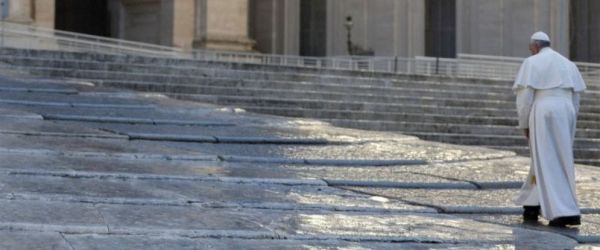Let us allow ourselves to be met by Jesus "with our guard down, open", so that he can renew us from the depths of our souls. This is Pope Francis' invitation at the beginning of the Advent season. The Pontiff addressed it to the faithful during the Mass celebrated this morning, Monday 2 December, in the chapel of Santa Marta.
The journey we begin in these days, he began, is "a new journey of the Church, a journey of the people of God, towards Christmas. And we walk to the encounter with the Lord'. Christmas is indeed an encounter: not just 'a temporal recurrence or,' the Pontiff specified, 'a memory of something beautiful. Christmas is more. We go on this road to meet the Lord'. So in the Advent season "we walk to meet Him. To encounter him with the heart, with life; to encounter him living, as he is; to encounter him with faith".
In truth, it is "not easy to live with faith", noted the Bishop of Rome. And he recalled the episode of the centurion who, according to the account in Matthew's Gospel (8:5-11), prostrates himself before Jesus to ask him to heal his servant. "The Lord, in the word we have heard," the Pope explained, "marvelled at this centurion. He marvelled at the faith he had. He had made a journey to meet the Lord. But he had done it in faith. Therefore not only did he meet the Lord, but he felt the joy of being met by the Lord. And this is precisely the encounter we want, the encounter of faith. To meet the Lord, but to be met by him. This is very important!".
When we limit ourselves only to meeting the Lord, he pointed out, 'we are the "masters" of this encounter'. When instead "we allow ourselves to be encountered by him, it is he who enters into us" and completely renews us.
"This," the Holy Father reiterated, "is what it means when Christ comes: to remake everything anew, to remake the heart, the soul, the life, the hope, the path".
At this time of the liturgical year, therefore, we are on a journey to meet the Lord, but also and above all "to let ourselves be met by him". And we must do this with an open heart, "so that he can meet me, tell me what he wants to tell me, which is not always what I want him to tell me!" Let us not forget then that "he is the Lord and he will tell me what he has for me", for each one of us, because "the Lord," the Pontiff specified, "does not look at us all together, as a mass: no, no! He looks at us one by one, in the face, in the eyes, because love is not an abstract love but a concrete love. Person by person. The Lord, person, looks at me, person'. That is why letting the Lord meet us ultimately means 'letting the Lord love us'.
"In the prayer at the beginning of the Mass," the Pontiff recalled, "we asked for the grace to make this journey with certain attitudes that help us. Perseverance in prayer: pray more. Hard work in fraternal charity: getting a little closer to those in need. And joy in praising the Lord". So 'let us begin this journey with prayer, charity and praise, with an open heart, so that the Lord may meet us'. But, the Pope asked in conclusion, "please, may he meet us with our guard down, open!"
[Pope Francis, St. Martha, in L'Osservatore Romano 02-03/12/2013]












